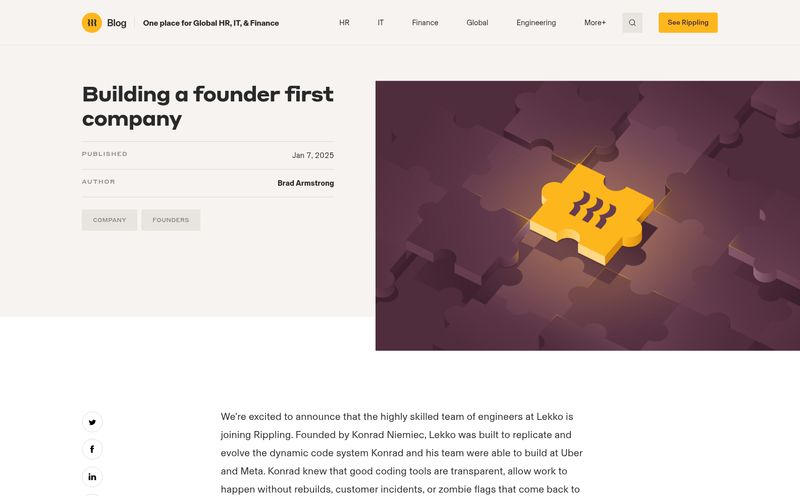As someone who lives and breathes SEO and online community building, I’m always on the hunt for the next tool that promises to make our lives easier. You know the drill. Scrolling through Product Hunt, keeping an eye on tech Twitter, looking for that spark of innovation. The other day, I stumbled upon a name that ticked all the right boxes: Coleap. The description was pure catnip for a guy like me: an AI-powered platform to streamline bootcamps, cohort-based courses, and learning communities.
“Amazing AI features,” it said. “Little operational effort,” it promised. My interest was officially piqued. So I did what any of us would do. I grabbed my coffee, opened a new tab, and navigated to their site, ready to see the future of online education. And I was greeted with… well, this.

Visit Coleap
A blank page. “Site Not Found.” The digital equivalent of a vacant lot where a bustling shop was supposed to be. Not a 404 error, which might just mean a broken link, but a message suggesting there’s nothing there at all. It’s a familiar story in the tech world isnt it? A promising spark that, for one reason or another, seems to have fizzled out. But what was that spark? What was the dream of Coleap? Let’s do a bit of digital archaeology.
What Was Coleap Supposed to Be?
From the breadcrumbs I could gather, Coleap was positioning itself as a creator's best friend. Think of the administrative nightmare that can be running a cohort-based course. You're juggling admissions, scheduling live sessions, tracking progress, fostering community discussions, and trying to actually teach on top of it all. It’s exhausting.
Coleap’s proposition was simple: let AI handle the heavy lifting. The platform was designed for a very specific, and very relevant, slice of the creator economy:
- Bootcamp Instructors: For those running intensive, hands-on learning sprints.
- Community Builders: For people managing paid learning communities or mastermind groups.
- Course Creators: Specifically those moving beyond the static, self-paced model and into more engaging, cohort-based online courses.
The goal was to automate the tedious stuff so creators could focus on creating genuine connections and delivering high-quality content. It’s the dream, really. More teaching, less tinkering with spreadsheets and email chains.
The Core Promise of AI-Powered Learning
The term “AI-powered” gets thrown around so much these days it’s almost lost all meaning. But in the context of a platform like Coleap, we can make some educated guesses about what it entailed. The marketing blurbs were vague, mentioning “amazing AI features” to enhance the user experience. In my experience, this usually points to a few key areas.
An AI Teaching Assistant
Imagine an AI that could summarize lengthy discussion threads for students who fall behind, or automatically generate quizzes based on a lecture transcript. Maybe it could even provide initial feedback on student submissions, flagging common errors before a human instructor ever sees it. This kind of support would be a game-changer, freeing up instructors from repetitive tasks and giving students instant, 24/7 support. It's less about replacing the teacher and more about giving them a powerful sidekick.
Streamlined Operations
“Reduces operational effort” was one of their big selling points. This likely meant things like smart scheduling that could find the best time for a group of students across multiple time zones, or automated onboarding sequences for new members. It might even have included AI-driven analytics to identify at-risk students who were falling behind or disengaging from the material. This is the nitty-gritty work that can consume a creator's entire day.
The All-Too-Familiar Silence on Pricing
Here’s something that wasn’t a surprise: no pricing information was readily available. Even on the directory pages where Coleap was listed, the pricing section was empty. This is a pet peeve of mine. It's the classic SaaS playbook: hide the price tag and force everyone into a sales call or a “Book a Demo” funnel.
I get the strategy—it allows for custom enterprise quotes and gives the sales team a chance to win you over. But for a solo creator or a small team, it’s a huge barrier. We just want to know if we can afford it. Is it $50 a month? $500? The lack of transparency is always a little frustrating and makes it hard to compare options quickly. In this case, the mystery of the price is now wrapped in the bigger mystery of the platform’s existence.
Weighing the Potential: The Good and the Questionable
Even as a digital ghost, the concept of Coleap presents a fascinating balance of pros and cons. It’s a snapshot of what so many in the online education space are striving for.
On one hand, the benefits were clear and compelling. The idea of an AI partner that reduces your workload and supports various learning formats—from a weekend mastermind to a 12-week bootcamp—is incredibly appealing. It speaks directly to the pain points of modern educators. Who wouldn't want to offload the busywork and focus on what they love?
However, there were red flags, even before the website vanished. The details on specific features were always a bit thin on the ground. Lots of promise, not much proof. Another point of friction is the reliance on AI for core functionality. What happens when the AI gets it wrong? Or when a student needs a level of nuance the machine can’t provide? It’s a dependency that some creators might be wary of. And of course, the biggest con of all is that, as of this writing, the platform seems to be inaccessible.
So, Where Did Coleap Go? A Bit of SEO Detective Work
This brings us back to the central mystery. What happens to a startup that just… disappears? A “Site Not Found” error isn’t a temporary glitch; it suggests the domain isn't connected to a server anymore. There are a few possibilities:
- A Pivot: The team might have shifted focus to a new product, letting the Coleap brand fade away.
- An Acquisition: A larger company could have bought them for their tech or talent (an “acqui-hire”) and absorbed the platform into their own ecosystem.
- Out of Runway: The simplest and often saddest explanation. They may have run out of funding before reaching profitability.
A quick search on platforms like Crunchbase or LinkedIn might reveal some clues, but often these smaller ventures vanish without a press release. It serves as a stark reminder for anyone building a business on top of another platform: always have a backup plan. The tools we rely on can be ephemeral. For now, Coleap exists as a case study, a collection of promising blurbs on software directories—a digital ghost in the machine.
Frequently Asked Questions About Coleap
What was Coleap?
Coleap was an online platform designed to help creators run bootcamps, cohort-based courses, learning communities, and mastermind groups. Its main selling point was the use of AI features to reduce the operational and administrative workload for instructors.
Who was Coleap for?
The platform targeted online educators and community builders who wanted to create more interactive learning experiences without getting bogged down by administrative tasks. This included bootcamp instructors, course creators, and community managers.
What were Coleap's main features?
While specific details were limited, Coleap's core features were advertised as AI-powered enhancements for user experience, support for various learning formats (courses, bootcamps, etc.), and tools to streamline operational effort for creators.
Is Coleap still active?
As of late 2023, the Coleap website is inactive and displays a "Site Not Found" message, which suggests the platform is no longer operational. Its current status is unknown.
How much did Coleap cost?
Coleap never publicly listed its pricing. This information was not available on its site or on third-party directories, suggesting potential customers needed to contact the company for a quote.
A Final Thought on Digital Ghosts
The story of Coleap, or what we can piece together of it, is more than just a review of a defunct tool. It’s a lesson in the fast-paced, often brutal world of tech startups. An amazing idea isn’t always enough. Execution, funding, marketing, and a bit of luck all play their part. While we may never get to experience Coleap’s AI-driven vision, its ghost serves a purpose. It reminds us to be critical of hype, to value transparency, and to appreciate the tools that do manage to stick around and help us build our communities. The dream of an AI teaching assistant lives on, and I, for one, will keep searching for it.
Reference and Sources
Information for this article was based on publicly available data from software directories and archival searches. The official website for Coleap was found to be inactive at the time of writing.
- Maven - Cohort-Based Course Platform: https://maven.com/
- Disco - Learning Community Platform: https://www.disco.co/
- Kajabi - All-in-One Creator Platform: https://www.kajabi.com/



